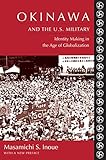Okinawa and the U.S. Military : Identity Making in the Age of Globalization / Masamichi Inoue.
Material type: TextPublisher: New York, NY : Columbia University Press, [2007]Copyright date: ©2007Edition: With a new prefaceDescription: 1 online resource (344 p.) : 27 illustrationsContent type:
TextPublisher: New York, NY : Columbia University Press, [2007]Copyright date: ©2007Edition: With a new prefaceDescription: 1 online resource (344 p.) : 27 illustrationsContent type: - 9780231138901
- 9780231511148
- 355.70952/294
- UA26.O53 I56 2007
- online - DeGruyter
- Issued also in print.
| Item type | Current library | Call number | URL | Status | Notes | Barcode | |
|---|---|---|---|---|---|---|---|
 eBook
eBook
|
Biblioteca "Angelicum" Pont. Univ. S.Tommaso d'Aquino Nuvola online | online - DeGruyter (Browse shelf(Opens below)) | Online access | Not for loan (Accesso limitato) | Accesso per gli utenti autorizzati / Access for authorized users | (dgr)9780231511148 |
Frontmatter -- CONTENTS -- List of Illustrations -- Acknowledgments -- 1. Introduction -- 2. The Rape Incident and the Predicaments of Okinawan Identity -- 3. Reduced to Culture without Politics and History -- 4. "We Are Okinawans of a Different Kind" -- 5. "We Are Okinawans" -- 6. Nago City Referendum -- 7. The Nago City Mayoral Election: and the Changing Tide of Okinawan Resistance -- 8. Conclusion: Anthropologists as the Third Person, Anthropology in the Global Public Sphere -- Notes -- Chronology -- References -- Index
restricted access online access with authorization star
http://purl.org/coar/access_right/c_16ec
In 1995, an Okinawan schoolgirl was brutally raped by several U.S. servicemen. The incident triggered a chain of protests by women's groups, teachers' associations, labor unions, reformist political parties, and various grassroots organizations across Okinawa prefecture. Reaction to the crime culminated in a rally attended by some 85,000 people, including business leaders and conservative politicians who had seldom raised their voices against the U.S. military presence.Using this event as a point of reference, Inoue explores how Okinawans began to regard themselves less as a group of uniformly poor and oppressed people and more as a confident, diverse, middle-class citizenry embracing the ideals of democracy, human rights, and women's equality. As this identity of resistance has grown, however, the Japanese government has simultaneously worked to subvert it, pressuring Okinawans to support a continued U.S. presence. Inoue traces these developments as well, revealing the ways in which Tokyo has assisted the United States in implementing a system of governance that continues to expand through the full participation and cooperation of residents.Inoue deftly connects local social concerns with the larger political processes of the Japanese nation and the global strategies of the United States. He critically engages social-movement literature along with postmodern/structural/colonial discourses and popular currents and themes in Okinawan and Japanese studies. Rich in historical and ethnographical detail, this volume is a nuanced portrait of the impact of Japanese colonialism, World War II, and U.S. military bases on the formation of contemporary Okinawan identity.
Issued also in print.
Mode of access: Internet via World Wide Web.
In English.
Description based on online resource; title from PDF title page (publisher's Web site, viewed 02. Mrz 2022)


